Remembering Football’s Forgotten Stars: Atlanta Falcons
Every team in the NFL has its own collection of heroes. Players who played key roles in helping that franchise reach their greatest heights. Some of these players have been enshrined in the Pro Football Hall of Fame and are forever immortalized. However, many players who endeared themselves to the home fans, but were not quite Hall of Fame worthy, have been forgotten as time passes and new players take their place.
This fall we are going team-by-team across the NFL featuring some of the “Forgotten Stars” whose greatness was valuable to their team, but who have been largely forgotten over time. We are not simply highlighting the best players from a franchise who are not in the Hall of Fame, but instead featuring some of the players who were important contributors and helped define the team during their era.
Some of these players probably should be in the Hall of Fame and were well known stars, while others were simply solid players and are remembered primarily only by true fans.
This week we look at the Atlanta Falcons, a franchise that despite having some great players during their 45 years in the NFL, just celebrated the first Falcon with at least five years of service with the team to enter the Hall of Fame with the recent induction of Deion Sanders.
Many of the players we are featuring probably would already be in the Hall of Fame had they played in New York, Dallas or for some other consistently successful team. Instead, they toiled in obscurity in Atlanta for a franchise that took more than 40 years to register their first back-to-back winning seasons.
William Andrews – Had it not been for an injury suffered during the 1984 preseason, it is very likely that William Andrews would have a bust in Canton and be on the short list of NFL all-time great running backs.
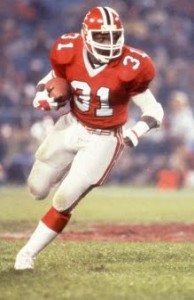
William Andrews gained over 1,000 yards rushing in a season four times during his first five NFL seasons.
During his first five NFL seasons, Andrews gained 5,772 yards rushing and caught 272 passes for 2,612 additional yards for an average of 116 yards per scrimmage per game. Just to give some comparison, NFL all-time leading rusher Emmitt Smith averaged 96 yards rushing and receiving per game during his career, Walter Payton averaged 111 and Barry Sanders 119.
As a rookie in 1979, Andrews established a new team record with 1,023 yards rushing while catching 39 passes for 309 yards. Though used primarily as a blocker in college at Auburn, he rushed for 167 yards in his first NFL game and proved to be a powerful runner and excellent receiver.
He ranked fourth in the NFL with 1,308 yards rushing in 1980 and the following season was seventh with 1,301 yards on the ground. In 1981 he also caught 81 passes for 735 yards and led the NFL with 2,036 yards from scrimmage.
The 1983 campaign proved to be his finest as Andrews rushed for a career-high 1,567 yards. He also caught 59 passes for 609 yards and finished second in the NFL with 2,176 yards from scrimmage. At the time, his season yardage total was the third highest for a single season in NFL history (behind only O.J. Simpson in 1975 and Eric Dickerson in the same 1983 season) and it still ranks as the 24th best single season total in league history.
A four-time Pro Bowl selection, Andrews was injured during the 1984 preseason and missed two seasons before returning for one campaign in 1986. However, he was only a shell of his former self and rushed for only 214 yards and caught only five passes while playing at both fullback and tight end.
Though he will likely never earn a place in the Pro Football Hall of Fame, Andrews did have his number retired by the Falcons in 2004.
Steve Bartkowski – Before Steve Bartkowski was selected by the Falcons with the first overall pick in the 1975 NFL Draft, Atlanta quarterbacks had eclipsed the 2,000 yard passing mark only twice in nine years. Despite struggling with injuries for much of his 11 seasons with the Falcons, Bartkowski managed to top that mark six times, including three years with more than 3,000 yards passing.
Though Bartkowski had great quarterback size at 6-foot-4 and 215 pounds, durability was never his strength. He started every game only three times in his career and played in 121 out of a possible 163 games for the Falcons.
Bartkowski made 11 starts as a rookie and started to show his ability toward the end of the season. He passed for 281 yards and three touchdowns in a week 12 30-27 loss to playoff bound Washington and then the next week passed for 305 yards and two touchdowns in a 31-9 win over the San Francisco 49ers.
Injuries kept Bartkowski from establishing himself over the next two seasons, but in 1978 he was healthy for most of the season and led the Falcons to a 9-7 record and their first playoff appearance. He passed for 243 yards and two touchdowns to lift the Falcons to a 14-13 win over the Eagles in their playoff opener. The next week the Falcons lost to Dallas 27-20.
Bartkowski started every game during both the 1980 and 1981 seasons and it is no coincidence that those were his two finest seasons with both ending in Pro Bowl appearances.
In 1980 he completed 55.5% of his passes for 3,544 yards and a league-high 31 touchdowns as Atlanta posted a 12-4 record and won the NFC West for the first time in team history.
Though the Falcons fell to 7-9 the next season, he passed for a career-high 3,829 yards with 30 touchdowns.
Bartkowski remained with Atlanta through the 1985 season before completing his career with one season in Los Angeles. He remains Atlanta’s career leader in passing yards with 23,470 and touchdown passes with 156.
Claude Humphrey – A dominant defensive end, Humphrey had come closer to reaching the Hall of Fame than any other Falcon before Sanders.
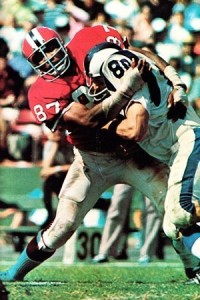
Claude Humphrey was a first or second team all-conference selection seven times between 1970 and 1977.
Originally drafted in the first round of the 1968 draft out of Tennessee State, Humphrey was named the NFL Defensive Rookie of the Year during his first season in the NFL and in 10 seasons with the Falcons was a six-time Pro Bowl selection and twice earned first team All-Pro recognition.
Humphrey had 11.5 sacks during his rookie season and made his first Pro Bowl appearance in 1970. He was a first or second team All-NFC selection every season between 1970 and 1977 with the exception of 1975, when he missed the entire season with a knee injury.
It was originally questioned as to whether Humphreys would be able to return to the field after his injury, but in 1976 he was better than ever as he registered a career-high 15 sacks.
After playing on only one winning team in Atlanta, Humphrey retired after four games of the 1978 season. Ironically, the Falcons reached the playoffs for the first time during that season.
He was traded to the Philadelphia Eagles in 1979 and in three seasons with the Eagles continued his dominant pass rushing. He was second on the team in sacks in 1979 and then in 1980 had 14.5 sacks to help lead the Eagles to the Super Bowl.
Though sacks were not an official statistic until after Humphrey retired, he finished his career with 122 career sacks.
He has been a finalist for the Pro Football Hall of Fame four times, most recently in 2009, but has yet to receive the call for induction.
Mike Kenn – For 17 years, Mike Kenn was a fixture at left tackle for the Falcons as he started more games than anyone else in team history.
A five time Pro Bowl choice and two-time first team All-Pro, it is very likely that the fact that Atlanta posted only four winning seasons during his career (including eight straight from 1983-1990) is a major reason he didn’t gain further recognition.
The 13th selection in the 1978 NFL Draft out of Michigan, Kenn moved into the starting lineup as a rookie and started all 251 games in which he played for the Falcons.
He earned first team All-Pro honors and a spot in his first Pro Bowl in 1980 when the Falcons went 12-4 and won the NFC East. Kenn was chosen to five straight Pro Bowls and was a first team All-NFC selection every year between 1980 and 1984, but even though he continued to be one of the top tackles in the league, the recognition stopped when the Falcons started to struggle.
It wasn’t until 1991, when the Falcons went 10-6 and reached the playoffs for the first time since 1982, that Kenn again earned All-Pro recognition.
He retired following the 1994 campaign and his number has been retired by the Falcons. His long and productive career is certainly equal to many offensive linemen that have earned induction into the Hall of Fame, so hopefully he will soon receive serious consideration by the selection committee.
Tommy Nobis – The first draft choice in the history of the Atlanta Falcons, Tommy Nobis brought instant credibility and recognition to the expansion franchise. A two-time All-American at the University of Texas, Nobis was held in such high regard following his collegiate career that in a message from space, Gemini 7 astronaut Frank Borman sent a message back to earth saying “tell Nobis to sign with Houston” after he was drafted by both the Falcons and the Houston Oilers of the AFL.
Even a message from space couldn’t keep Nobis from signing with the Falcons. His presence was felt immediately as Nobis was the NFL’s defensive rookie of the year and according to team records registered 294 tackles during that season. Granted Nobis probably had a lot of chances during that first season, but even if that tackle total is slightly inflated it illustrates that Nobis made an immediate impact for his new team.
Nobis was named to the Pro Bowl in each of his first three seasons and was a first team All-Pro in 1967. Injuries limited him to just a combined nine games in 1969 and 1971, but he was still considered one of the elite linebackers in the league and was a Pro Bowl selection in 1970 and 1972.
He played four additional seasons for the Falcons without gaining additional All-Pro or Pro Bowl recognition, but did lead the Falcons in tackles each of those campaigns. Overall, he led the squad in tackles every season of his career except his two injury plagued campaigns.
No other Falcon has ever worn the number 60 and his number has also been retired by the University of Texas.
Probably more than any of the other Falcons, that Nobis has never earned selection to the Hall of Fame is likely a product of the poor teams on which he played. The Falcons had only one winning campaign during his 11 seasons and didn’t reach the playoffs until two years after his retirement.
Jeff Van Note – One long-standing tradition in the NFL has been for teams to have a grizzled veteran center that spends a decade or more bent over the football and anchoring the offensive line. Playing that role for the Falcons during the 1970s and 1980s was former 11th round draft choice Jeff Van Note.
During a 16-year stretch from 1970-1985, Van Note started 226 out of a possible 233 games at center for the Falcons and in the process earned five trips to the Pro Bowl.
Drafted out of Kentucky to play linebacker after having been a running back and defensive end in college, Van Note was soon moved to offensive line by head coach Norm Van Brocklin.
He played only one game during his rookie season in 1969, but moved into the starting lineup the next year and was the stalwart of the Falcons line as the team moved to respectability.
Van Note helped lead the way when Dave Hampton became the first Atlanta running back to rush for 1,000 yards in a season in 1975 and also blocked for 1,000-yard runners William Andrews and Gerald Riggs.
The Falcons retired his number 57 during his final game with the team in 1986. Since his retirement, Van Note has served as a radio broadcaster for several teams including the Falcons and the Georgia Tech Yellow Jackets.
Other Forgotten Falcons:
In addition to the players highlighted above, there have been many other great Falcons whose exploits have been largely forgotten by time. Included among these players are:
Jamal Anderson: Much like William Andrews two decades earlier, Anderson’s tenure in Atlanta included four brilliant seasons and a knee injury that caused a rapid decline in productivity. Anderson had four 1,000 seasons, including gaining a team-record 1,846 yards while leading the Falcons to a Super Bowl appearance in 1998.
Bob Berry: The primary starting quarterback for the Falcons from 1968-1972, Berry was the first quarterback in Falcons history to eclipse 2,000 passing yards in a season and threw for 8,489 yards and 57 touchdowns during his five seasons with the team.
Ray Buchanan: After starting his career with the Colts, Buchanan spent seven years as a cornerback for the Falcons and grabbed 30 of his 47 career interceptions with Atlanta. He was a Pro Bowl selection during the 1998 Super Bowl season as he grabbed a team-high 7 interceptions.
Cannonball Butler: The team rushing leader in each of his four seasons in Atlanta, Butler gained 2,250 yards rushing and also caught passes for 718 yards for the Falcons. He also averaged 24.2 yards per kickoff return during his time in Atlanta.
Scott Case: A fixture in the defensive backfield of the Falcons for 11 seasons, Case played three different positions (strong safety, cornerback, free safety) at different points of his career. He had 30 career interceptions, including 10 in 1988 when he earned Pro Bowl selection.
Chris Chandler: In five seasons guiding the Falcons, Chandler made two Pro Bowl appearances and helped Atlanta reach the Super Bowl for the only time in team history. He passed for 13,268 yards and 87 touchdowns for Atlanta.
Bill Fralic: In eight seasons as an offensive guard for the Falcons, Fralic was a four time Pro Bowl selection and twice named a first team All-Pro.
Dave Hampton: After coming close twice with seasons of 995 and 997 yards rushing, in 1975 Hampton finally became the first Atlanta Falcons running back to reach 1,000 yards in a season as he finished with 1,002 yards on the ground. He gained 3,482 yards during five seasons in Atlanta.
Alfred Jenkins: Though small in stature at 5-foot-10 and 170 pounds, Jenkins came up big for the Falcons as an explosive receiving threat during his nine seasons with the team. He led the NFL in receiving yards in 1981 and during his career caught 360 passes for 6,267 yards and 40 touchdowns.
John James: As punter for a team that often struggled offensively, James was often the busiest guy on the team. He led the NFL in punt attempts four times, including a then NFL record 109 punts in 1978. In 10 seasons in Atlanta, James averaged 40.8 yards per attempt.
Rolland Lawrence: Despite being only 5-foot-10 and 179 pounds, Lawrence registered 39 interceptions during nine seasons with the Falcons, including nine picks in 1975. He was a first team All-NFL selection in 1977.
Terance Mathis: During eight seasons in Atlanta, Mathis caught 573 passes for 7,349 yards and 57 touchdowns. He grabbed 111 passes for 1,342 yards and made a trip to the Pro Bowl during his first season with the team in 1994.
Tim Mazzetti: A graduate of the University of Pennsylvania, Mazzetti joined the Falcons during the 1978 season after previously working as a bartender. In just his second game, Mazzetti accounted for all of Atlanta’s points with five field goals during a 15-7 win over the Los Angeles Rams on Monday Night Football. He ended up spending three seasons in Atlanta and scored 230 points, including 103 in 1980.
Chris Miller: A first round pick by the Falcons in 1987, Miller led the team to a division title while earning a Pro Bowl spot in 1991. However, he was 23-43 as a starter with the Falcons despite passing for 14,066 yards with 87 touchdowns and only 72 interceptions.
Jim Mitchell: One of the best, yet forgotten, tight ends of his generation, Mitchell was a two-time Pro Bowl selection and caught 305 passes for 4,358 yards (14.3 ypc) during his 11 years with the Falcons. He earned Pro Bowl honors as a rookie in 1969 and also received Pro Bowl selection in 1972.
Ken Reaves: An original Falcon, Reaves intercepted 29 passes during eight seasons as a defensive back for the Falcons. He was a Pro Bowl selection in 1969 and had a career-high seven interceptions in 1967.
Gerald Riggs: After spending two seasons backing up William Andrews, Riggs moved into the lineup following Andrews’ injury in 1984 and over the next four seasons rushed for 5,407 yards and was a three time Pro Bowl selection.
Andre Rison: The best five years of Rison’s excellent NFL career was from 1990-1994 while he played for the Falcons. He averaged 85 catches and 1,127 yards per season while being selected for four Pro Bowls.
Jessie Tuggle: Spending his entire 14-year career as a linebacker with the Falcons, Tuggle was a five time Pro Bowl selection and twice recorded more than 200 tackles in a season.
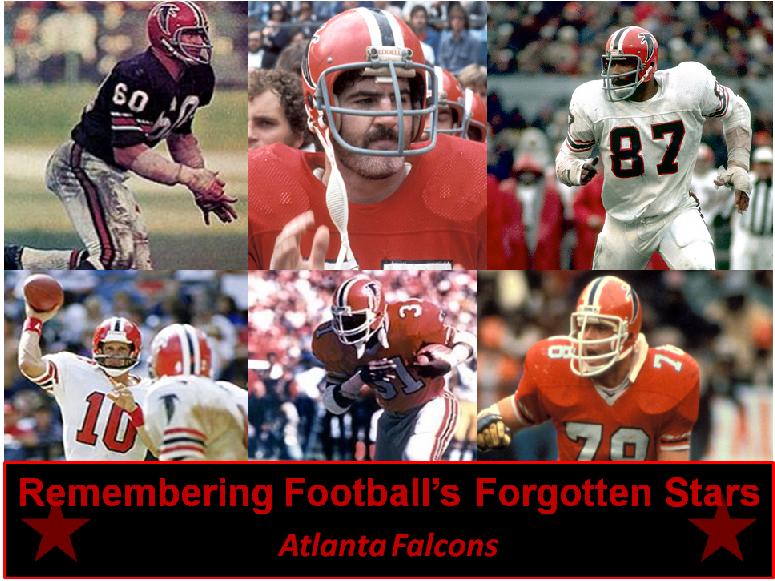
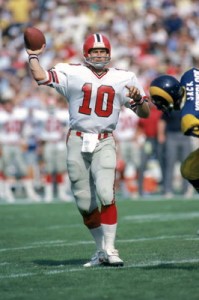
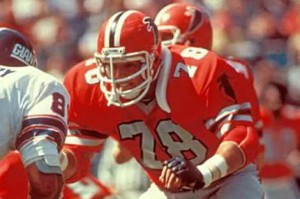
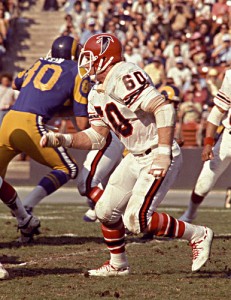
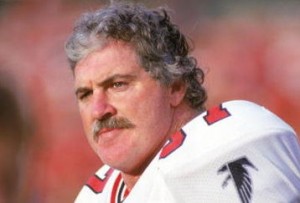
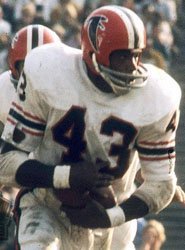
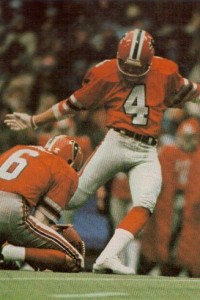
I think you mean Chris Miller. Al Richardson, Buddy Curry, Ray Brown, Fulton Kuykendall were all solid long-time Falcons, and Billy Johnson and Harmon Wages had some fun moments.
Thanks Bobby, not sure how I flubbed that first name. When I started digging with the Falcons there have been a lot of those long-time good players who weren't quite great. Hard to mention them all so I appreciate you mentioning some that could be added to my list. Should have included Harmon Wages if only for his name. I was going to include Johnson, but was surprised that he really had only two good (not great) seasons in Atlanta and I figured I will mention him when we do the Oilers/Texans.
Success for Managers is: Time to help my own people realize who they can be, not just what they can do.
Maybe some day
What i don’t realize is in fact how you are not actually much more well-favored than you may be right now. You are very intelligent. You realize therefore considerably on the subject of this subject, produced me personally believe it from a lot of numerous angles. Its like men and women are not fascinated until it is one thing to do with Girl gaga! Your personal stuffs nice. At all times deal with it up!
I am not sure the place you are getting your information, but great topic. I must spend a while studying more or working out more. Thanks for magnificent info I used to be looking for this information for my mission.
It is the best time to make a few plans for the longer term and it is time to be happy. I have read this submit and if I may just I desire to counsel you few fascinating issues or advice. Maybe you can write next articles regarding this article. I wish to read more issues approximately it!
Just wish to say your article is as amazing. The clarity in your submit is simply excellent and i can suppose you’re knowledgeable on this subject. Fine with your permission let me to clutch your feed to stay up to date with approaching post. Thank you one million and please continue the enjoyable work.
Hello, Neat post. There is a problem with your web site in web explorer, may check this? IE still is the marketplace chief and a huge section of other people will leave out your magnificent writing because of this problem.
I am now not certain where you are getting your info, however great topic. I must spend some time finding out more or understanding more. Thanks for wonderful info I used to be searching for this information for my mission.
Very great post. I just stumbled upon your weblog and wished to mention that I have truly loved surfing around your weblog posts. After all I?ll be subscribing for your rss feed and I am hoping you write again very soon!
To make sure with your main points, but just a few have to be brought up further, I’ll hold a little talk to my partners and maybe I’ll seek out you some suggestion soon.
It?s actually a nice and helpful piece of information. I?m happy that you simply shared this helpful info with us. Please keep us informed like this. Thank you for sharing.
When someone writes an article he/she retains the thought of a user in his/her mind that how
a user can be aware of it. So that’s why this paragraph is
perfect. Thanks!
My web-site 直営 スクエアトゥ 品質 (Dominik)
I pay a quick visit day-to-day some websites and blogs to read articles,
but this website presents feature based articles.
You might realize by now that it is not difficult for you to make money
with Facebook page. When you employ Facebook advertising, you get noticed easily.
At third-party review websites like CNET, Top – Ten – Reviews, or ZDNet, there are tools such as “Facebook monitor” or “Facebook parental control” solutions.